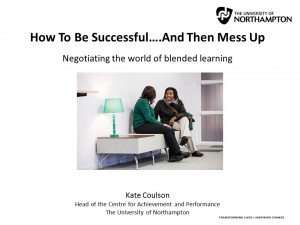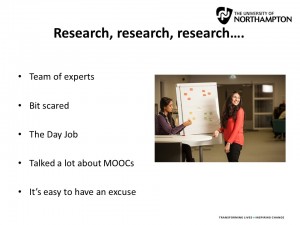Download slides: PDF / Powerpoint
 Since 2013, the Centre for Achievement and Performance has been actively engaged in the development of online and blended learning: from developing tailored e-tivities to be embedded in modules in liaison with subject academic staff, to creating Open Educational Resources (OER) for access via NILE and the LLS Skills Hub as well as developing entire online courses which are offered to those applying to study at the University of Northampton. Most of this content is presented via video, study guides, interactive tutorials and using tools such as asynchronous discussion boards. This new focus is a common theme across all Learning Development activity in the UK and beyond and reflects the current practice and pedagogical approach at the University of Northampton (UniNorthampton, 2016).
Since 2013, the Centre for Achievement and Performance has been actively engaged in the development of online and blended learning: from developing tailored e-tivities to be embedded in modules in liaison with subject academic staff, to creating Open Educational Resources (OER) for access via NILE and the LLS Skills Hub as well as developing entire online courses which are offered to those applying to study at the University of Northampton. Most of this content is presented via video, study guides, interactive tutorials and using tools such as asynchronous discussion boards. This new focus is a common theme across all Learning Development activity in the UK and beyond and reflects the current practice and pedagogical approach at the University of Northampton (UniNorthampton, 2016).
During this time, the Study Skills for Academic Success (SSAS) online course (formally known as a Massive Open Online Course or MOOC) was developed using a CAIeRO (Institute of Learning and Teaching, 2016) / Carpe Diem (Salmon, 2016) team-based approach. This online course ran successfully throughout 2013 and 2014. After each course had been delivered, the course team would reflect upon their experiences in conjunction with feedback from the participants and enacted changes accordingly. At the end of 2014, it was decided to reduce the length of the course from eight to six weeks. This was primarily because the course was running two or three times per annum, was managed by CfAP Tutors (which required daily active interaction with participants via discussion boards) and the demand for face-to-face student drop ins, tutorials and workshops had increased.
 The course ran three times in 2015 and the enrolment, participation and completion rates were collated in December 2015. It was clear from the data that the previous successes of the eight week course no longer applied to the six week version. It had clearly been successful and then had been “messed it up”. This paper will outline why the eight week course was successful – in MOOC terms – , how the six week course failed. It will also outline what might be done next…
The course ran three times in 2015 and the enrolment, participation and completion rates were collated in December 2015. It was clear from the data that the previous successes of the eight week course no longer applied to the six week version. It had clearly been successful and then had been “messed it up”. This paper will outline why the eight week course was successful – in MOOC terms – , how the six week course failed. It will also outline what might be done next…
References
Institute of Learning and Teaching (2016) CAIeRO and Course Redesign. University of Northampton. [online]. Available from: http://www.northamptonilt.com/caiero-for-course-teams [Accessed 26 January 2016].
Salmon, G. (2016) Carpe Diem – A Team Based Approach to Learning Design. Gilly Salmon. [online]. Available from: http://www.gillysalmon.com/carpe-diem.html [Accessed 26 January 2016].
UniNorthampton. (2016) The University of Northampton’s Approach to Learning and Teaching. YouTube. [online]. Available from: https://www.youtube.com/watch?v=tOwbqaoJUoc&feature=youtu.be [Accessed 26 January 2016].
